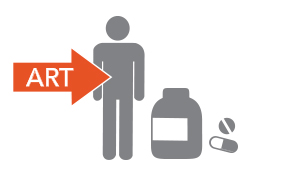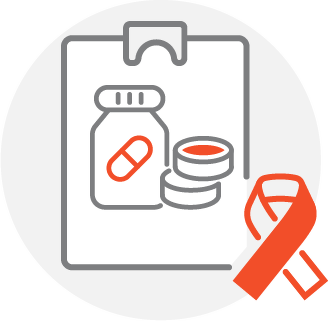What is the course about?
The course is comprised of 4 sections with various sub-topics. Each section has between 15 and 35 lectures of 7 -10 minutes. The course language is English with English and Russian sub-titles. It can be followed as a full course (almost 90 lectures, 10 - 15 hours) or you can choose the chapters or sections relevant for you.
Who is it for?
The course is for anyone interested! It is aimed at people working in HIV and infectious diseases in the health care sector, community health clinics, testing sites and public health - especially in Eastern Europe and East Asia.
What will I learn?
By the end of this course, students will be able to:
- differentiate the clinical manifestations of HIV-related diseases
- propose relevant diagnosis, monitoring, and treatment strategies for HIV infection and related diseases according to EACS and WHO guidelines
- recognise benefits and adverse effects of various HIV drug therapies including PrEP and Treatment as Prevention
- understand the role of combination prevention and integrated testing of HIV/HBV/HCV and STIs in reducing transmission
- understand the need for optimisation of treatment programmes to reach all in need of ART
- understand the complexity and necessity of a multi-sectorial approach to decrease transmission of HIV and co-infections
Course Structure
The course consists of 4 sections:
Section 1. Clinical Management of HIV

Different HIV related opportunistic infections and HIV co-morbidities:
Immune Reconstitution Inflammatory Syndrome (IRIS), HIV-related Pulmonary Infections, Central Nervous System & HIV, Central nervous System & HIV-related Opportunistic Infections, Tuberculosis and HIV Co-Infection, Hepatitis C and HIV Co-Infection, Epidemiology of cancers and HIV, Clinical Management of Cancers and HIV, CVD/CKD/Endocrinology.
Antiretroviral therapy (ART):
which ART to start, adherence to ART and when to start.
Section 2. Treatment as Prevention

The principles of PrEP:
Key populations for PrEP, how to prescribe and monitor PrEP, adherence to PrEP.
How to Diagnose and Manage HIV Seroconversion.
Treatment as Prevention:
The role of treatment as part of prevention strategies and the impact on the HIV epidemic.
Section 3. Public Health Perspectives: Prevention, Testing and Linkage to care

Testing and linkage to care:
Different approaches to HIV testing and the role of integrated testing and linkage to care.
Monitoring and Evaluation:
Monitoring of the HIV epidemic.
Evaluation of public health interventions to decrease transmission HIV and other BBV.
Combination Prevention:
Principles of combination prevention.
Planning and implementing combination prevention programmes.
Section 4. Optimization of treatment programmes

Optimization of ART programmes:
Programmatic considerations and challenges related to transition to new ARV drugs.
Cost effectiveness of using generic ART in HIV treatment programmes
Clinical Considerations regarding new ARVs
Monitoring of ARVs toxicity and HIV drug resistance.
Course options
Audit Track (for free)
No special requirements.
Audit track with Certificate of Participation (29 €)
For obtaining your Certificate of Participation in the Audit Track, you need to gain progress by watching the video lectures and quizzes and pay the fee.
This course is, unusual to other courses, that you might know from iversity, divided into sections. Sections let you personalise your learning experience. You can select and then finish those course sections that are the most useful for you instead of doing the whole course from the beginning to the end. Finish the first section and download your first version of your Statement of Participation. An updated version will be available after each section you finish.
Подробнее о курсе
Курс состоит из 4 разделов с различными подтемами. Каждая секция имеет от 15 до 35 лекций продолжительностью 7 -10 минут. Курс проводится на английском с русскими и английскими субтитрами. Курс можно пройти полностью (почти 90 лекций, 10 - 15 часов) или выбрать актуальные для вас главы или разделы.
Для кого этот курс?
Курс подходит для всех, кто интересуется этой темой! Он предназначен для людей, работающих с ВИЧ и инфекционными заболеваниями в секторе здравоохранения, медицинских клиниках на уровне сообществ, пунктах тестирования и здравоохранении, особенно в Восточной Европе и Восточной Азии.
Какие знания вы получите?
По окончанию курса, участники смогут:
- распознавать клинические симптомы заболеваний, связанных с ВИЧ
- предлагать соответствующие стратегии диагностики, мониторинга и лечения ВИЧ-инфекции и связанных с ней заболеваний в соответствии с рекомендациями EACS и ВОЗ
- распознавать преимущества и побочные эффекты различных лекарственных терапий ВИЧ-инфекции, включая PrEP и лечения как профилактики
- понимать роль комбинированной профилактики и интегрированного тестирования ВИЧ/ВГВ/ВГС и ИППП в сокращения передачи
- понимать необходимость оптимизации программ лечения для охвата всех нуждающихся в АРТ
- понимать комплексность и необходимость многосекторального подхода к снижению передачи ВИЧ и сопутствующих инфекций.
Структура курса
Курс состоит из 4 разделов:
Секция 1. Клиническое ведение ВИЧ-инфекции

Различные оппортунистические инфекции, связанные с ВИЧ и сопутствующие заболевания:
Воспалительный синдром восстановления иммунитета (IRIS или ВСВИ); инфекции легких связанные с ВИЧ; центральная нервная система и ВИЧ; ЦНС и оппортунистические инфекции, связанные с ВИЧ; туберкулез и коинфекция ВИЧ; гепатит C и коинфекция ВИЧ; эпидемиология раковых заболеваний и ВИЧ; клиническое ведение раковых заболеваний и ВИЧ; сердечно-сосудистые заболевания (CVD)/хронические заболевания почек (CKD)/эндокринология.
Антиретровирусная терапия (АРТ):
какую АРТ иницировать, приверженность к АРТ и когда начинать.
Секция 2. Лечение как профилактика

Принципы PrEP:
Ключевые группы населения для PrEP, как назначать и контролировать PrEP, приверженность к PrEP.
Диагностика и ведение сероконверсии ВИЧ.
Лечение как профилактика:
Роль лечения в рамках стратегий профилактики и воздействие на эпидемию ВИЧ.
Секция 3. Перспективы здравоохранения: профилактика, тестирование и увязывание с лечением

Тестирование и увязывание с лечением:
Различные подходы к тестированию на ВИЧ и роль интегрированного тестирования и увязывания с лечением.
Мониторинг и оценка:
Мониторинг эпидемии ВИЧ.
Оценка мер здравоохранения по снижению передачи ВИЧ и других гемоконтактных вирусов.
Комбинированная профилактика:
Принципы комбинированной профилактики.
Планирование и внедрение программ комбинированной профилактики.
Секция 4. Оптимизация программ лечения

Оптимизация программ АРТ:
Программные соображения и проблемы, связанные с переходом на новые АРВ-препараты.
Экономическая эффективность использования генерических препаратов АРТ в программах лечения ВИЧ.
Клинические соображения относительно новых АРВ.
Мониторинг токсичности АРВ и лекарственной устойчивости к ВИЧ.
Course instructors
EACS online course EACS
Manuel Battegay
As a clinician and clinical researcher, Prof. Manuel Battegay has been active in the field of HIV/AIDS since 1988. He is particularly interested in the clinical course of HIV, namely the optimisation of the response to therapy and immune reconstitution as well as on psychosocial issues. Since 1994, he has been a board member of the Swiss HIV Cohort Study Group and chaired the Scientific Board from 1998-2002. Since 2006, he has been a member of the Governing Board of the European AIDS Clinical Society (EACS). He became President of the Society in 2012 after acting as vice-president for four years. He was co-chair of the 14th and 15th EACS Conferences in Brussels in 2013 and Barcelona in 2015, respectively. He is a faculty member of International Antiviral Society-USA and member of the scientific committee of the biennial Glasgow International Congress on Drug Therapy in HIV Infection. Along with the Swiss Tropical and Public Health Institute, he actively participated in upbuilding a large rural HIV Clinic at the St. Francis Referral Hospital in Ifakara, Tanzania.
His current research focuses on improving the response to antiviral therapy, specifically immune reconstitution and aspects related directly to HIV antiviral therapy and other topics in Infectious Diseases.
Jens Lundgren
Prof. Lundgren has more than 20 years of expertise in leading large international research related to infectious complications in HIV-positive persons and transplant recipients funded by the European Commission (EuroSIDA in EuroCoord), the European Medicines Agency (D:A:D) and NIH (INSIGHT studies). He is the lead of the European-funded networks and co-founder of the global infectious disease research network INSIGHT. He founded MATCH in 2010 to monitor viral infections in transplant patients at Rigshospitalet, now funded by a grant from the Danish National Research Foundation, it turned into a research platform across Rigshospitalet to identify factors predicting the risk of infectious complication in immune deficient patients.
Jean-Michel Molina
Jean-Michel Molina is Professor of Infectious Diseases at the University of Paris Diderot - Paris 7, France, and Head of the Infectious Diseases Department at the Saint-Louis Hospital in Paris. He received his medical degree from the University School of Medicine of Necker, Paris, and his PhD from the University School of Medicine of Bichat, Paris. Professor Molina completed his internship and residency at the Assistance Publique Hôpitaux de Paris, with a post-doctoral fellowship at Harvard University, Boston, on studies related to HIV infection of stem cells and macrophages.
Professor Molina continues to be involved in basic HIV research and is affiliated to the INSERM U941 in the Saint-Louis Hospital. As the Head of the Infectious Disease Department in the Saint-Louis Hospital, Professor Molina mainly treats immunocompromised HIV-infected patients, bone marrow and renal transplant patients, and patients with haematologic malignancies and cancers.
Professor Molina’s primary clinical research interest lies in the area of the treatment of HIV infection, and he has been involved in a number of studies assessing new drugs or new strategies for the treatment of HIV infection. A cohort of more than 3,500 patients with HIV infection is followed in his department and is involved in this clinical research.
Professor Molina has published numerous papers in a wide variety of scientific journals, including Clinical Infectious Diseases, the Journal of Infectious Diseases, the New England Journal of Medicine, the Lancet, the Journal of Clinical Microbiology, and AIDS.
He is the Chair of the Clinical Trial Group at the French National Agency for AIDS Research (ANRS), where multicentre clinical trials are reviewed and implemented in France. Working with the ANRS, Professor Molina has been the principal investigator of a number of clinical trials in HIV-infected patients.
More recently, Professor Molina has broadened his field of interest to the prevention of HIV-infection in high risk individuals using Pre-exposure prophylaxis with TDF/FTC and has been the PI of the ANRS Ipergay trial using on demand PrEP.




